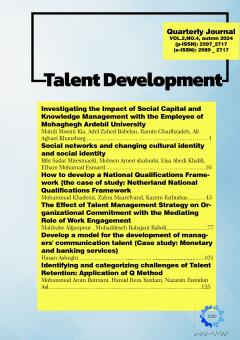How to develop a National Qualifications Framework (the case of study: Netherland National Qualifications Framework)
Subject Areas : New concepts affecting adult learningMohammad khademi 1 , زهرا معارف وند 2 * , kazem fathtabar 3
1 -
2 -
3 -
Keywords: Development, Framework, Qualification, National, Netherland,
Abstract :
In recent years, one of the issues that is taken into consideration of educational policy-makers and the employment system is the development of the national qualifications framework (NQFs) and its development and approval by the relevant authorities. In fact, the national qualifications framework which is also a formal and legal document, specifies that the graduates must have knowledge, skills and attitudes at the different level, and what is the vertical and horizontal relationship of these qualifications?. NQFs with a comprehensive view of the types of training, seeks to employ human resources based on the talents and competencies that individuals acquire through the necessary training (formal and informal). The present study was conducted with purpose to identify How to develop national qualifications framework in the Netherlands As a leading country in this regard. This study in terms of the purpose is fundamenta reseach and in terms of data gathering is descriptive to method of library studies. In this research, in order to answer the research questions, with Whole number (census) method, is examined the published documents and available resources in relation to the national qualifications framework of the Netherlands. The information collected from the examination of documents Presented by the arrangement of elements and Component of the national qualifications framework (development and implementation a framework, levels and qualification, level descriptors, volume and credibility, quality assurance system, vocational education system, stakeholders and institutions involved in development and implementing the national qualifications framework of the netherland).
1. Raffe, D. (2013). What is the Evidence for the Impact of National Qualifications Frameworks?. Comparative Education, 49 (2), 143-162.
2. European Parliament and European Council. (2008). Recommendation of the European Parliament and of the Council of 23 April 2008 on the Establishment of the European Qualifications Framework for Lifelong Learning. Official Journal of the European Union, 51(C 111), 1-7.
3. Policies and Criteria for the Establishment of the National Framework of Qualifications (2003). Published by: National Qualifications Authority of Ireland.
4. The European Qualifications Framework for Lifelong Learning (EQF) (2008). Luxembourg: Office for official publications of the European Communities.
5. Tuck, R. (2007). An Introductory Guide to National Qualifications Frameworks: Conceptual and Practical issues for Policy Makers. Geneva: ILO.
6. Commission of European Communities. (2005). Commission Staff Document: Towards a European Qualifications Framework for Lifelong Learning. Avalable at: https://www.voced.edu.au.
7. Keevy, J., Chakroun, B., & Deij, A. (2011). Transnational Qualifications Frameworks. Luxembourg: Publications Office of the European Union.
8. Cedefop. (2016). European Inventory on Validation of Non-Formal and Informal Learning .Country Report: the Netherlands. Available at: http://www.cedefop.europa.eu/en/events-and-projects.
9. Sanden, K. V. D., Smit, W., & Dashorst, M. (2012). The Referencing Document of the Dutch National Qualification Framework to the European Qualification Framework. Brussels: European Commission.
10. Cedefop. (2017). National Qualifications Framework Developments in Europe: Anniversary Edition. Publications Office of the European Union.
11. The Higher Education Qualifications Framework in the Netherlands, a Presentation for Compatibility with the Framework for Qualifications of the European Higher Education Area. (2008). Self-certification Document.

